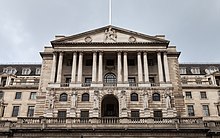
Back المدرسة الكلاسيكية الحديثة Arabic Yeni klassik makroiqtisadiyyat Azerbaijani Нова класическа макроикономика Bulgarian Nova klasična ekonomija BS Nová klasická makroekonomie Czech Nyklassisk økonomi Danish Neue Klassische Makroökonomik German Nueva economía clásica Spanish اقتصاد کلان کلاسیک نو Persian Nouvelle économie classique French
| Part of a series on |
| Macroeconomics |
|---|
 |
New classical macroeconomics, sometimes simply called new classical economics, is a school of thought in macroeconomics that builds its analysis entirely on a neoclassical framework. Specifically, it emphasizes the importance of rigorous foundations based on microeconomics, especially rational expectations.
New classical macroeconomics strives to provide neoclassical microeconomic foundations for macroeconomic analysis. This is in contrast with its rival new Keynesian school that uses microfoundations, such as price stickiness and imperfect competition, to generate macroeconomic models similar to earlier, Keynesian ones.[1]
- ^ Chapter 1. Snowdon, Brian and Vane, Howard R., (2005). Modern Macroeconomics: Its Origin, Development and Current State. Edward Elgar Publishing, ISBN 1-84542-208-2
© MMXXIII Rich X Search. We shall prevail. All rights reserved. Rich X Search